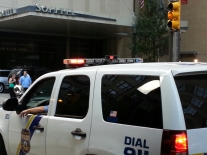 Philly Declaration – by Dustin Slaughter
Philly Declaration – by Dustin Slaughter
The City of Philadelphia does not want you to know in which neighborhoods the Philadelphia Police Department (PPD) is focusing their use of powerful automatic license plate readers (ALPR), nor do they want disclosed the effectiveness (or lack thereof) of this technology, as they continue to fight a Declaration public records request filed in January with MuckRock News.
City officials argue in their response that every metro driver is under investigation, in an effort to exempt so-called criminal investigatory records from release under PA’s Right-to-Know Act:

We appealed the city’s decision last week and await the state’s Office of Open Records (OOR) decision, although because these records are deemed “investigatory”, even if the OOR rules that the city’s denial lacks merit, the Philadelphia District Attorney’s Office will have the final say, and OOR does not have enforcement powers. That would leave open the possibility of a lawsuit.
The city did see fit to include what they claim is a two week summary of the department’s ALPR usage, although without the raw data we requested, there is no way to verify its accuracy:

The current leg of our investigation seeks a two week glimpse of raw license plate reader data, specifically to determine which neighborhoods the surveillance technology is most prevalently used, as well as its impact on crimes ranging from minor infractions such as outstanding traffic tickets and lapsed insurance, to more serious matters like car thefts and counterterrorism efforts. We also want to determine if PPD is disproportionately targeting with its ALPR program low-income neighborhoods and areas where people of color predominantly reside.
Last year, The Declaration began an investigation of PPD’s use of license plate readers. We learned that the police department has an ALPR fleet consisting of at least ten units that comb city traffic, snapping thousands of plate images per minute, and storing them on a server located inside the Philadelphia Police Department’s fusion center, known as the Delaware Valley Intelligence Center; read our previous reporting to learn more about how plate data is pooled and likely accessed by federal officials at the fusion center.
According to a policy document first obtained by Philly-based journalist Christopher Moraff, the police department retains this plate data for an entire year, regardless of whether drivers are under investigation. Moreover, police store this information indefinitely should plate data be used as part of an investigation.
Legal advocacy organizations including the ACLU of Southern California and Electronic Frontier Foundation are currently fighting a protracted legal battle with the Los Angeles Police Department over that agency’s ALPR records. Last year, the LAPD used a legal argument similar to Philly’s, maintaining that all ALPR scans (whether or not those scans were later used in criminal investigations) are investigatory in nature, and therefore must be withheld from the public. Los Angeles Superior Court agreed with the LAPD. The ACLU and EFF appealed the decision in January and are awaiting an appellate court’s ruling.
EFF had more success with obtaining records from the Oakland Police Department, however. Comparing just eight days of raw data this year to Census statistics, EFF’s analysis found that OPD targeted its ALPR program in neighborhoods with significantly lower per-capita income, and those populated largely by African Americans and Hispanics. EFF also discovered that police “did not use ALPR surveillance in the southeast part of Oakland nearly as much as in the north, west, and central parts of Oakland, even though there seems to be just as much crime.”
While there is no question this technology can be useful in certain instances, such as this 2014 incident involving a ‘road rage’ shooter in Center City, the department’s lengthy data retention period raises significant privacy and Constitutional issues, because of the glimpse it provides into innocent people’s lives, including activities many people assume are not subject to law enforcement scrutiny, such as visits to a doctor’s office, or whose residence we visit – information, according to PPD’s own policy, that police can access with relative ease.
The department launched its ALPR program in or around 2011, according to Newsworks’reporter Tom MacDonald. Police Commissioner Charles H. Ramsey told MacDonald he believes ALPRs are a highly effective crime fighting tool:
“I used them when I was in the District of Columbia and the number of arrests for auto theft went up pretty dramatically.”
A 2013 Boston Globe investigation by journalist Shawn Musgrave found a significantly different picture of ALPR use by that city’s police department, however. After the Boston Police Department accidentally released over 68,000 unredacted license plate numbers in response to a records request from Musgrave, an error that raised serious questions about BPD’s ability to responsibly handle sensitive data, the release also revealed repeated failures to follow-up on license plate “hits”.
For example, the Globe reported that a stolen motorcycle “passed license plate scanners a total of 59 times between Oct. 19, 2012, and March 13, 2013. It was often recorded on sequential days or multiple times in a single day, all by the same scanner and almost always within the same half-hour span in the early evening,” but was never stopped by police.
As a result of the Globe‘s reporting, Boston police discontinued its license plate reader program pending review by then-commissioner William Evans. Musgrave this week toldThe Declaration that two years later, BPD has not resumed the program.
For the latest on our Philly police ALPR reporting and other law enforcement stories, subscribe to us via email and follow us on Twitter and Facebook. You can also check out MuckRock News for updates on our ongoing records request, and other FOIA-based reporting.
